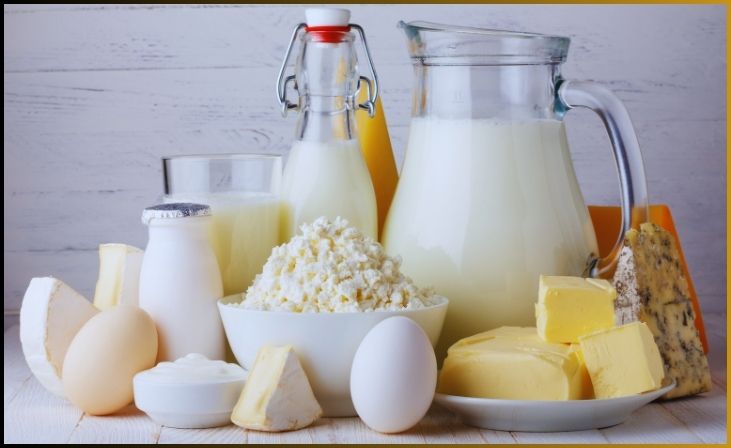As we age, our nutritional needs change, and it becomes increasingly important to focus on maintaining a healthy diet. While there are many foods that can support overall health and well-being, there are also certain foods that may be best to avoid as we enter our forties and beyond. In this blog post, we will explore the top ten foods to avoid after 40. These foods may have negative effects on weight management, heart health, bone strength, and other aspects of our well-being. By being mindful of our dietary choices and avoiding these foods, we can promote better health and vitality as we navigate the aging process.
It’s important to note that while these foods may be best to avoid or consume in moderation, individual dietary needs and health conditions may vary. Consulting with a healthcare professional or registered dietitian is recommended to personalize dietary recommendations based on individual health goals and needs.
Top Foods to Avoid After 40
As we age, our nutritional needs change, and making wise food choices becomes even more important. Certain foods that might have been a regular part of our diet in earlier years might not be as suitable for our health after the age of 40. Here’s a list of the top 10 foods to avoid to ensure your well-being and vitality as you navigate the journey of middle age.
1. Fried Foods

Indulging in fried foods may be tempting, but the repercussions become more pronounced after the age of 40. These foods, often high in unhealthy fats and calories, can contribute to weight gain and pose an increased risk of heart disease. The combination of excess oil and the high temperatures involved in frying creates harmful compounds that not only add to the calorie count but also contribute to inflammation within the body. Inflammation, a known factor in various chronic diseases, becomes a significant concern as we age. Therefore, opting for healthier cooking methods, such as baking, grilling, or steaming, is advisable to promote cardiovascular health and overall well-being after reaching the age of 40.
Quick Link: 10 Foods That Naturally Boost Your Energy Levels
2. Artificial Sweeteners

Artificial sweeteners, often considered low-calorie alternatives to sugar, may seem like a viable option, especially for those over 40 looking to manage their weight. However, their impact on metabolism and the potential to induce cravings for sweet foods should not be overlooked. Consuming artificial sweeteners in moderation is advisable, as excessive intake may disrupt metabolic processes. Opting for natural sweeteners, such as honey or maple syrup, when sweetness is desired can be a healthier choice, considering the potential long-term effects on metabolism and overall well-being, particularly as individuals navigate the challenges of maintaining a balanced diet after the age of 40.
3. Sugary Breakfast Cereals

Despite the marketing claims of being nutritious, many sugary breakfast cereals are often far from ideal, particularly for individuals over 40. Laden with refined grains and added sugars, these cereals lack essential nutrients and can lead to rapid spikes in blood sugar levels. The consequence of such spikes is a subsequent crash, leaving individuals feeling hungry and unsatisfied later in the day. This can be especially problematic for those navigating the dietary challenges that often accompany the age of 40 and beyond. As a result, opting for whole-grain, low-sugar alternatives for breakfast becomes crucial for maintaining stable energy levels and promoting overall health.
4. White Bread and Pasta

Refined grains, including staples like white bread and pasta, pose challenges for individuals over 40 due to their tendency to cause sudden spikes in blood sugar levels. The absence of fiber in these refined options contributes to this issue. To counteract this, it is advisable to choose whole grains like whole wheat, brown rice, and quinoa. These alternatives not only provide sustained energy but also support digestive health, an aspect particularly important as the body ages. The inclusion of whole grains in the diet becomes an essential strategy for maintaining stable blood sugar levels and promoting overall well-being in individuals navigating their nutritional needs beyond the age of 40.
5. Alcohol

Excessive alcohol consumption poses heightened risks for individuals over 40, potentially leading to various health issues such as liver disease, obesity, and certain types of cancer. The impact of alcohol on the body becomes more significant with age, making moderation a crucial consideration. Being mindful of alcohol intake is essential for maintaining overall health and well-being. Opting for moderation ensures that the potential negative effects of alcohol on vital organs, metabolic processes, and cancer risk are minimized. As individuals age, it becomes imperative to make informed choices about alcohol consumption to safeguard long-term health and mitigate the associated risks that can escalate with excessive intake.
6. High-Fat Dairy Products

High-fat dairy products, including full-fat cheese, butter, and cream, can pose potential health risks for individuals over 40. These products have been linked to elevated cholesterol levels and an increased risk of heart disease. Making informed dietary choices by opting for low-fat or non-dairy alternatives is crucial to mitigate these risks. As people age, the impact of dietary choices on heart health becomes more pronounced, necessitating a shift toward heart-friendly options. Choosing low-fat or non-dairy alternatives ensures a balance between enjoying dairy as part of a diet and safeguarding cardiovascular health.
This proactive approach supports overall well-being and reduces the risk factors associated with high-fat dairy consumption, promoting heart health as individuals navigate their forties and beyond.
7. Sugary Drinks

Sugary drinks, often high in added sugars, pose significant health risks, especially for individuals over 40. Regular consumption of these beverages can contribute to weight gain, elevate the risk of diabetes, and lead to dental problems. Opting for water, herbal tea, or unsweetened beverages is a healthier alternative, reducing the intake of empty calories and mitigating potential health issues. As people age, prioritizing hydration with these healthier drink choices becomes crucial for maintaining overall well-being.
The decision to replace sugary drinks with hydrating alternatives is a proactive step toward supporting metabolic health and preventing the adverse effects associated with excessive sugar intake. This mindful approach to beverage choices enhances the quality of the diet, aligning with the changing nutritional needs and health considerations that come with reaching the age of 40 and beyond.
Also check: Eating Well for Healthy Aging: Top 7 Foods to Include in Your Diet
8. Processed Meats

Processed meats, including bacon, sausages, and deli meats, contain high levels of sodium, unhealthy fats, and additives. Regular consumption of these meats has been associated with an elevated risk of heart disease and specific types of cancer. To make healthier dietary choices after 40, consider opting for lean protein sources such as poultry, fish, and legumes. These alternatives not only provide essential nutrients but also contribute to maintaining a heart-healthy diet.
The decision to reduce the intake of processed meats aligns with overall well-being goals, promoting cardiovascular health and reducing the risk factors associated with age-related health concerns. Embracing lean protein options reflects a proactive approach to nutrition, acknowledging the impact of dietary choices on long-term health outcomes as individuals navigate their 40s and beyond.
9. Trans Fats

Trans fats, prevalent in processed snacks, baked goods, and fried foods, pose a significant threat to heart health. These fats elevate levels of bad cholesterol (LDL) while concurrently reducing good cholesterol (HDL), thereby amplifying the risk of heart disease. The negative impact on cholesterol levels underscores the importance of minimizing the consumption of trans fats in the diet. Avoiding processed snacks and opting for healthier cooking methods can aid in sidestepping these harmful fats.
The awareness of the detrimental effects of trans fats becomes crucial, especially after the age of 40, as individuals strive to make informed dietary choices for long-term heart health. Making a conscious effort to choose foods without trans fats aligns with a proactive approach to cardiovascular well-being, promoting a heart-healthy lifestyle in the later stages of life.
10. High-Sodium Foods

Excessive sodium intake poses significant health risks, including high blood pressure, kidney problems, and heart disease. Vigilance is crucial when it comes to packaged and processed foods, as they often conceal high levels of sodium. Choosing whole, fresh foods over their processed counterparts becomes an essential strategy to manage sodium intake effectively.
The use of herbs and spices to enhance flavor offers a healthier alternative to excessive salt usage. After the age of 40, being mindful of sodium consumption becomes increasingly important for cardiovascular health. By adopting a diet rich in whole, minimally processed foods and incorporating flavorful herbs, individuals can proactively manage their sodium intake, contributing to overall well-being in the long run.
Making informed food choices after 40 is crucial for maintaining your health and well-being. By avoiding these foods and focusing on a balanced diet rich in whole grains, lean proteins, fruits, and vegetables, you’ll be better equipped to enjoy a vibrant and fulfilling life well into your middle age.
Bottom Line
In conclusion, making informed and health-conscious food choices is paramount for promoting well-being after the age of 40. By avoiding certain foods that may negatively impact metabolism, bone health, and hormonal balance, individuals can proactively contribute to their overall health and vitality.
Remember, it’s never too late to adopt a healthier lifestyle and embrace dietary habits that support long-term well-being. Consulting with healthcare professionals, such as nutritionists or dietitians, can provide personalized guidance tailored to individual needs and goals.
As we age, the relationship with food becomes increasingly influential on our health outcomes. By prioritizing nutrient-dense options, maintaining a balanced diet, and avoiding specific foods that may pose risks, individuals can embark on a journey towards aging gracefully and enjoying a fulfilling, healthy life beyond 40.
FAQs
After 40, it’s crucial to focus on nutrient-dense foods, including fruits, vegetables, lean proteins, and whole grains. Additionally, limiting the intake of processed foods, added sugars and excessive amounts of saturated fats can positively impact health.
Some foods may contribute to age-related concerns such as decreased metabolism, bone density issues, and hormonal imbalances. Avoiding these foods helps mitigate potential health risks and supports overall well-being.
While general dietary guidelines exist, consulting with a healthcare professional, such as a nutritionist or dietitian, can provide personalized advice based on individual health conditions, goals, and preferences.
Absolutely. It’s never too late to make positive changes. Adopting healthier eating habits, including choosing nutrient-rich foods and avoiding detrimental ones, can contribute to improved health, energy levels, and quality of life after the age of 40.







